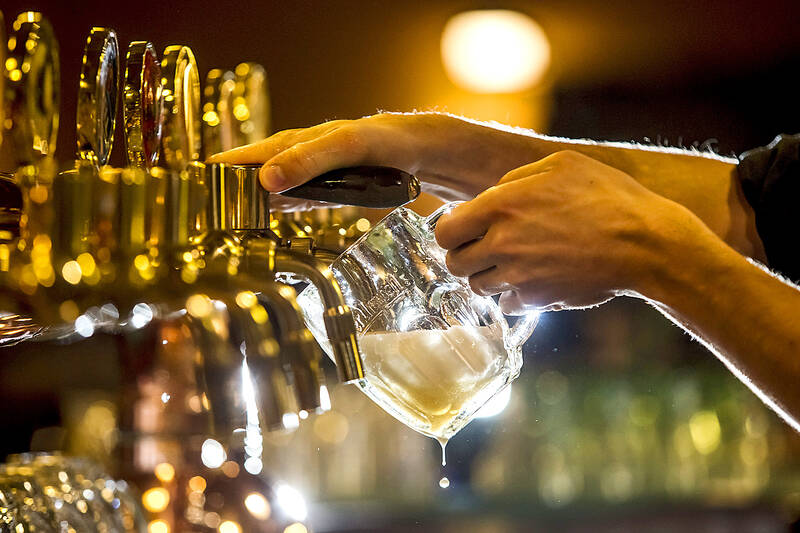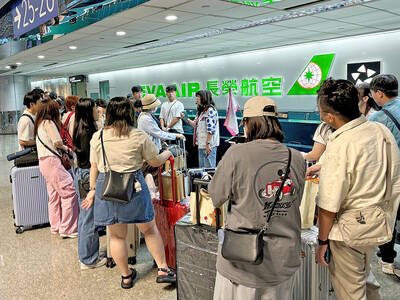EMPLOYMENT
Foreign bartenders allowed
Foreign bartenders can now legally work in Taiwan, following a Ministry of Labor regulatory revision to the Employment Service Act (就業服務法) reclassifying bartending as a specialized or technical occupation. Foreign bartenders can obtain a work permit, provided they have worked for two years at a bar or restaurant, or for one year at a business recognized by organizations such as the Michelin Guide. Work experience requirements are waived for those who have won prizes in certain international bartending competitions, the ministry said. Foreign bartenders must receive a minimum monthly salary of NT$47,971 (US$1,464), while employers must hold a valid business license to hire them. Foreign bartenders’ job responsibilities must be restricted to mixing alcoholic and nonalcoholic cocktails, providing technical training, designing drink menus, consulting on bar operations and customer service for a work permit to be granted, it said.

Photo: Bloomberg
Warning: Excessive consumption of alcohol can damage your health.
TRADITION
Pilgrimage details released
The annual Matsu pilgrimage is to begin late at night on April 4, at the Jenn Lann Temple (鎮瀾宮) in Taichung’s Dajia District (大甲), the organizer said on Wednesday. The nine-day, eight-night pilgrimage is to start at 10:45pm at the temple and would also end at the temple on April 13, they said. The date and time of the Matsu pilgrimage this year were decided after Jenn Lann Temple chairman Yen Ching-piao (顏清標) threw two crescent-shaped divining blocks on the ground in front of the statue of Matsu during a ceremony to seek divine guidance, the temple said. The pilgrimage route is to include stops at a number of temples in Taichung, Changhua, Yunlin and Chiayi.
CRIME
Mayor’s trial to resume
The High Court is to resume the trial for Hsinchu Mayor Ann Kao (高虹安), who was charged with corruption, after the Constitutional Court rejected its request to review the constitutionality of a law cited in the case last week. The Taipei District Court in July last year found Kao guilty of filing fraudulent expense claims to pay staff hired with public funds during her time as a Taiwan People’s Party legislator-at-large. She was sentenced to seven years and four months in prison and her civil rights were suspended for four years during the first trial. The High Court on Jan. 2 sought the Constitutional Court’s view on the law before proceeding with Kao’s appeal, citing concerns that Article 32 of the Organic Act of the Legislative Yuan (立法院組織法) contravened the principle of clarity and definiteness of law, which could affect the results of the trial. The Constitutional Court rejected the request, saying that the law cited was not applicable in making a final judgment on the defendant’s guilt or innocence.
DIPLOMACY
Envoy to Indonesia named
President William Lai (賴清德) has named Tourism Administration deputy head Trust Lin (林信任) as the new deputy representative to Indonesia, but did not say when Lin would take up his post in Jakarta. The appointment seeks to take advantage of Lin’s experience in tourism promotion and marketing, which would help Taiwan explore the emerging Muslim market in Indonesia, a diplomatic source said. Lin began his public sector service in 1990 as a specialist in the Ministry of Economic Affairs’ Statistics Division. He became the Tourism Bureau’s International Affairs Division head in 2005. Lin’s overseas postings include the Tourism Bureau’s Los Angeles and Singapore offices.

An alleged US government plan to encourage Taiwan Semiconductor Manufacturing Co (TSMC) to form a joint venture with Intel to boost US chipmaking would place the Taiwanese foundry giant in a more disadvantageous position than proposed tariffs on imported chips, a semiconductor expert said yesterday. If TSMC forms a joint venture with its US rival, it faces the risk of technology outflow, said Liu Pei-chen (劉佩真), a researcher at the Taiwan Industry Economics Database of the Taiwan Institute of Economic Research. A report by international financial services firm Baird said that Asia semiconductor supply chain talks suggest that the US government would

Starlux Airlines on Tuesday announced it is to launch new direct flights from Taiwan Taoyuan International Airport to Ontario, California, on June 2. The carrier said it plans to deploy the new-generation Airbus A350 on the Taipei-Ontario route. The Airbus A350 features a total of 306 seats, including four in first class, 26 in business class, 36 in premium economy and 240 in economy. According to Starlux’s initial schedule, four flights would run between Taoyuan and Ontario per week: Monday, Wednesday, Friday and Saturday. Flights are to depart from Taoyuan at 8:05pm and arrive in California at 5:05pm (local time), while return flights

Nearly 800 Indian tourists are to arrive this week on an incentive tour organized by Indian company Asian Painted Ltd, making it the largest tour group from the South Asian nation to visit since the COVID-19 pandemic. The travelers are scheduled to arrive in six batches from Sunday to Feb. 25 for five-day tours, the Tourism Administration said yesterday. The tour would take the travelers, most of whom are visiting Taiwan for the first time, to several tourist sites in Taipei and Yilan County, including tea houses in Taipei’s Maokong (貓空), Dadaocheng (大稻埕) and Ximending (西門町) areas. They would also visit

LITTORAL REGIMENTS: The US Marine Corps is transitioning to an ‘island hopping’ strategy to counterattack Beijing’s area denial strategy The US Marine Corps (USMC) has introduced new anti-drone systems to bolster air defense in the Pacific island chain amid growing Chinese military influence in the region, The Telegraph reported on Sunday. The new Marine Air Defense Integrated System (MADIS) Mk 1 is being developed to counter “the growing menace of unmanned aerial systems,” it cited the Marine Corps as saying. China has constructed a powerful defense mechanism in the Pacific Ocean west of the first island chain by deploying weapons such as rockets, submarines and anti-ship missiles — which is part of its anti-access/area denial (A2/AD) strategy against adversaries — the